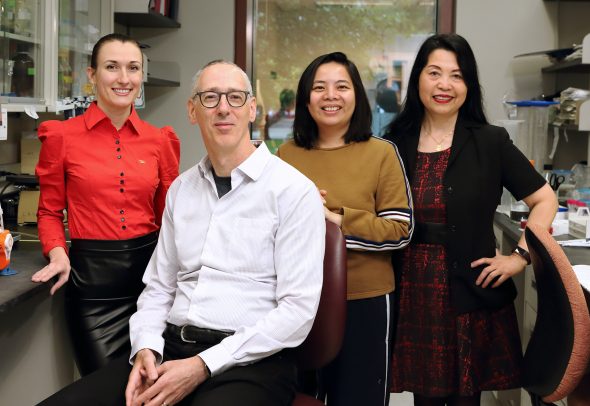UIC startup raises nearly $1M to help develop safer leukemia chemotherapy

Enzyme by Design, a startup company founded by UIC researchers in the department of biochemistry and molecular genetics, recently has secured nearly $1 million in total funding to help it further develop a less toxic version of chemotherapy commonly used to treat acute lymphoblastic leukemia, the most common type of pediatric cancer.
The company has identified a safer form of asparaginase, an enzyme used in chemotherapy. The enzyme breaks down an amino acid called asparagine. Unlike healthy cells, certain cancer cells can’t produce asparagine by themselves and need to take it from the blood. Asparaginase-based chemotherapies deplete levels of asparagine in the blood, causing cancer cells to die. But currently used asparaginases often cause severe side effects, including in some rare instances, death.
“Current asparaginase chemotherapies can have toxic side effects because they are derived from bacterial sources and retain bacterial markers that the body recognizes as foreign and which the immune system attacks. The drugs can also impact the liver and pancreas and cause blood clotting, which in rare instances can be fatal,” said Arnon Lavie, president and CEO of Enzyme by Design and professor of biochemistry and molecular genetics in the UIC College of Medicine. “The drug works really well to kill cancer cells, but we need a variant without these dangerous side effects. Our version of this enzyme is based on the mammalian gene for asparaginase and lacks the side activity and is predicted to be less toxic but as effective.”
The Enzyme by Design asparaginase comes from guinea pigs and was identified by Amanda Schalk, research assistant professor in biochemistry and molecular genetics at UIC.
“We purified and characterized asparaginase candidates from different sources and found that one particular enzyme found in guinea pigs had the necessary properties for a therapeutic. We used our protein engineering expertise to further make it more human-like without compromising its tumor cell-killing ability,” said Schalk, who also is chief operating officer of Enzyme by Design. “Compared to current FDA-approved drugs of this type, our new therapeutic has shown almost no toxic side effects in mice, it effectively depletes asparagine in their blood, and it is able to kill acute lymphoblastic leukemia cells, which are responsible for the most common form of childhood cancer.”
Hien Anh Nguyen, a research assistant professor in Lavie’s lab at UIC and chief scientific officer of Enzyme by Design, tested the guinea pig enzyme in vitro on human cancer cells and in mice that were injected with human leukemia cells. In both models, the enzyme successfully depleted asparagine and killed the cancer cells. Studies conducted at UIC’s toxicology research laboratory revealed no major signs of toxicity in mice given the asparaginase.
Enzyme by Design has secured approximately $1 million in funding from several sources, including two UIC Chancellor’s Innovation Fund grants, a Chicago Biomedical Consortium grant and two National Institutes of Health small business grants. Enzyme by Design also was recently chosen as the winner of the biopharma category by MedCity INVEST — a health care investor’s conference where developers could make a pitch.
“Getting our discovery out into the world where it has a chance to help patients is very important to me,” Lavie said. “Without the funding to take our translational discovery out into the real world, it would just sit on a shelf helping nobody. We are so grateful to UIC for the opportunities they have given us, especially the Office of Technology Management, to support the commercialization of our asparaginase.”
